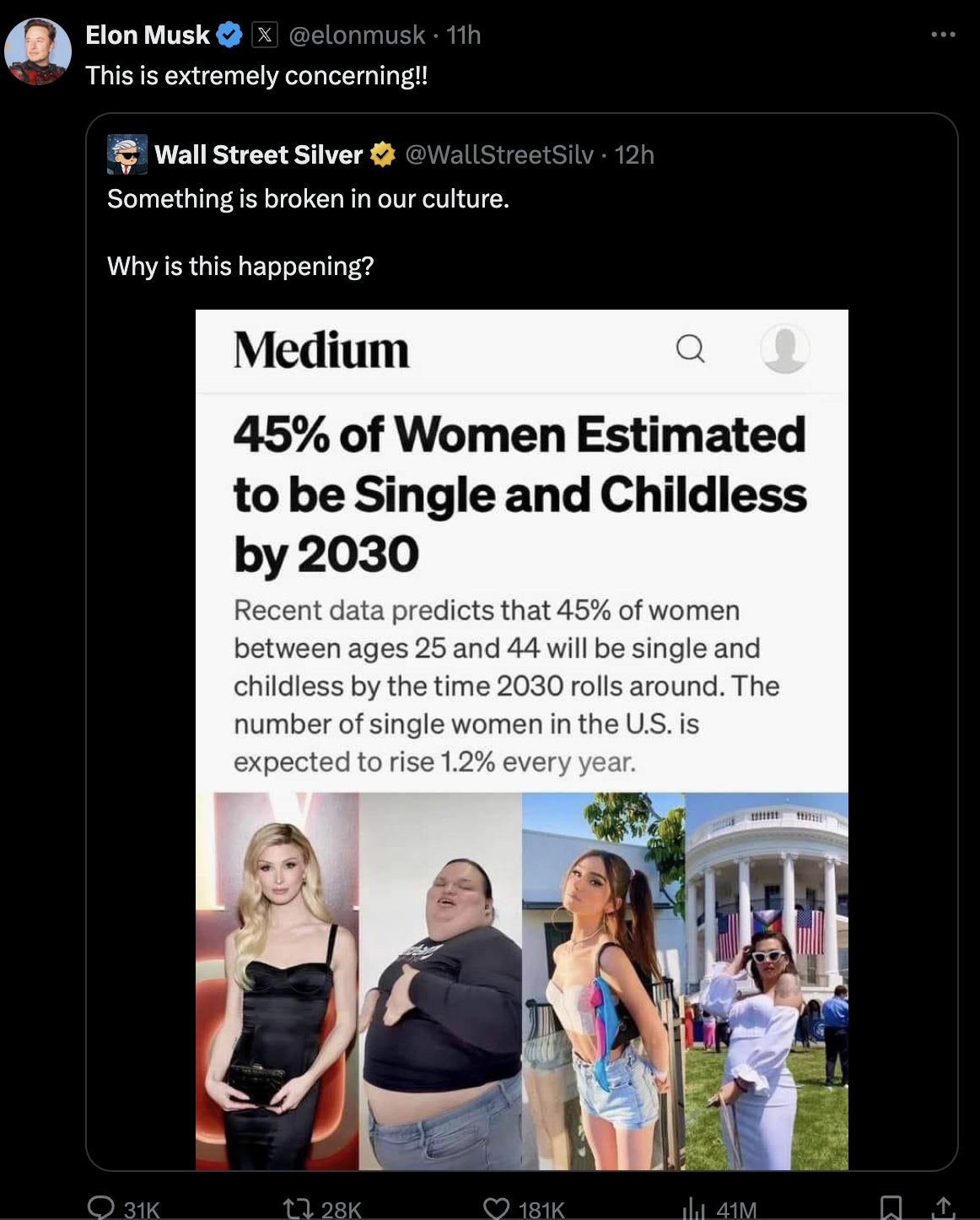Here's a breakdown of the provided text and image:
**Summary:**
The image shows a Medium article headline claiming that 45% of women aged 25-44 in the U.S. will be single and childless by 2030, with the number of single women increasing by 1.2% annually. Elon Musk retweeted this, calling it "extremely concerning," and Wall Street Silver commented that "something is broken in our culture." The image also includes photos of four individuals, seemingly unrelated to the statistic itself.
**Document type:**
Social media post (Twitter) referencing an article from Medium. The original post appears to be a news or opinion piece, aiming to express concern about societal trends. The retweets add commentary and amplify the original post's message.
**Claims:**
* **Main Claim:** 45% of women aged 25-44 in the U.S. will be single and childless by 2030.
* **Supporting Claim:** The number of single women in the U.S. is increasing by 1.2% yearly.
* **Implied Claim (from Musk and Wall Street Silver):** This trend reflects a negative societal problem or cultural breakdown.
**Implications:**
The claims imply a significant shift in family structures and societal norms in the U.S. The retweets frame this shift negatively, suggesting societal decline or dysfunction. The implications are far-reaching, potentially impacting discussions about marriage, family planning, economic policies, and cultural values.
**Biases:**
* **Selection Bias:** The article likely only highlights data supporting its conclusion. It doesn't account for the possibility that other factors (e.g., improved access to education, increased career opportunities, improved birth control, changing societal values) may also contribute to the numbers. The lack of a citation makes this bias more likely.
* **Confirmation Bias:** The retweeters (Elon Musk and Wall Street Silver) may have shared the article because it aligned with their pre-existing views on societal trends and family structures. They seem to have a negative view of the trend.
* **Framing Bias:** The presentation focuses on the negative aspect of the trend (single and childless), without acknowledging potential positives for individual women or societal benefits. It also uses emotionally charged language ("extremely concerning"). The photos further emphasize a biased presentation by including photos which may appeal to people who already share this negative view.
* **Data Source Bias:** The source of the "recent data" is not identified making it impossible to assess its quality, methods, or potential for bias.
**How we know claims are potentially false (or require substantial further investigation):**
The lack of a source for the data renders the main claim highly questionable. Without access to the methodology and the raw data, it's impossible to verify the accuracy of the 45% statistic and the 1.2% annual increase. The absence of a clearly identifiable and reliable source is a significant red flag. It’s also important to note that predictions, particularly those concerning social trends, are often inaccurate. Unexpected events and shifts in social attitudes may substantially alter the projected outcome.
Info Sleuth
What the user found on the internet:
elon musk

What to tell the user about it:
This social media post presents a concerning statistic: 45% of American women aged 25-44 will be single and childless by 2030, with a 1.2% annual increase in single women. While influential figures like Elon Musk have amplified this claim, the lack of a cited source for this data raises serious questions about its reliability. Before accepting this as fact, consider that the statistic may be selectively presented and that other societal factors—such as increased educational and career opportunities for women—could contribute to these numbers. The overall message focuses on the negative implications of this trend, neglecting potential positive aspects of individual choice. To gain a fuller picture, look for the original article and critically evaluate its methodology and data sources before drawing conclusions. Consider if other perspectives and contributing factors are missing from this presentation.
Suggested queries to learn more: